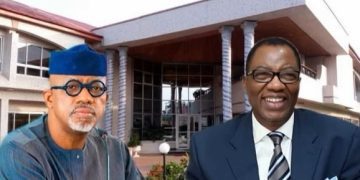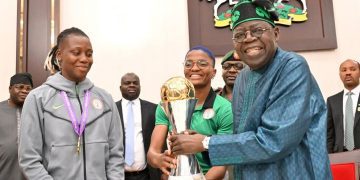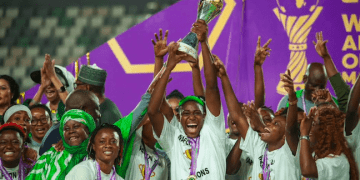By Ayobami Ife, Abeokuta
Ago-Iwoye: Ayodele Thomas Odunlami, born at Araromi Obu in Ondo State, is a veteran journalist and Professor of Broadcast Journalism. He is also the Dean, Faculty of Social Sciences, Department of Mass Communication, Olabisi Onabanjo University (OOU) Ago – Iwoye, Ogun State.
The towering Mass Communication scholar never wanted to choose academic as a life career even though it happened to be his first love. In fact, he shoved it aside at the beginning not on account of its being a rigorous and intellectually tasking profession. No. He is well cut out for it, having emerged one of the best graduates among his peers at the time. Besides, the far sighted ones among his mates who saw his today over two decades ago, had inadvertently decorated him with the appellation of a Professor, the highest academic rank exclusively reserved for people in the ivory tower when he was just in the newsroom turning out news items to inform, educate, entertain and enlighten his audience.
The unappealing life of lecturers in his undergraduate years due to their poor remuneration and sordid conditions of service that signposted the military era in the 80s and 90s as well as his parents’ modest background, made lecturing job a put off thing for him.
Instead, he opted for the glitzy world of the mass media, having felt at the time that it was better and more visible. For a decade, he traversed the terrains of print and broadcast journalism, stamping his name indelibly in the broadcast genre with the popular Hot Seat, a live television programme on Ogun State Television (OGTV).
But the Professor’s case is an example of one who kept resisting inner calls to join the academics when destiny repeatedly beckoned on him. And fortunately the destiny won the battle in March 2003 when he left his flourishing journalism career as a Principal Editor in OGTV to join the Academics as an Assistant Lecturer in OOU.
Odunlami revealed these on Tuesday, August 13, 2024 in the introduction to his foray into OOU as he took the dais to deliver the 119th inaugural lecture of the 42 years old state – owned university, where the Vice-Chancellor, Prof. Ayodeji Agboola, described him as a God-fearing, enterprising, and brilliant scholar and who has continued to use his wealth of knowledge to advance the cause of humanity and scholarly excellence.
Odulanmi said, “My journey into journalism and academics began right in Ago – Iwoye, then Ogun State University, 38 years ago as a student… Right from the onset, my school mates…pronounced me ‘Professor’ for reasons best known to them! However, the financial status of many of my lecturers then was, to say the least, ridiculous!
“Many of our professors would park their smoky and rickety cars on steep slopes beside lecture rooms and halls for easy jump-starting in the evenings at the close of work. We even assisted some of them to push their stubborn cars on their reluctant journeys home. Hence, not wanting to be condemned to such a life because I felt my parents were already poor enough, I opted for the glitzy world of the mass media which I felt was better and more visible.
“First, I embraced newspaper and later television. Fate conspired with prophecy against me because no sooner than I started getting regular by – lines did everyone start calling me ‘Prof,’ ‘Prof’ again! The situation got so embarrassing one day, I featured the late Professor Segun Odunuga of the Faculty of Arts on Hot Seat, a live television programme on Ogun State Television (OGTV). The programme over, as I was seeing my guest off to his car, along the corridor at the studio, my colleagues started calling ‘Prof,’ ‘ Prof’! My guest was confused and wondered who was the real Prof? Alas! After ten years in the media, I could no longer resist the pressure to come back to academics, my first love… By the benevolence of God and His Grace, dint of yard work, persistence and through the help of men I do not only profess, I’m here to render an account of my academic sojourn since March 3rd, 2003 when I came back ‘home’ to where I rightly belong.”
Delivering his inaugural lecture titled: “(Re)moving The Ancient Landmarks? How Technology Deconstruct The Mass Media,” he made an urgent case for Nigeria to mobilise technology and professionals in the media practice to tackle the high incidence of fake news, cyberbullying and ethnic profiling, which he said was threatening the fabrics of unity and stability of the country.
Prof. Odunlami said the call has become necessary and imperative as the digital space has been saturated with all manners of media absurdities made possible by technology and Artificial Intelligence (AI) that confuse the average Nigerian mass media products consumer to a degree that no one knows the right from the wrong as well as what and who to believe anymore.
Noting that not just members of the nation’s political class are routine subjects and victims of fake news and cyber bullying, he said that everybody has become a victim, urging that the professionals should be empowered with skills and technology through the normal traditional media to “tell the story first” before fake news purveyors and to dismantle any fake news quickly and effectively as it slipped into the digital space.
Citing a fake photo portraying President Bola Ahmed Tinubu as sick during the build up to the 2023 Presidential election and the AI – generated image of Pope Francis in a jumpsuit among others to emphasise the grave danger of disruptive technology posed to mass media practice, he appealed to the Government and stakeholders in the mass media industry to invest in massive digital literacy skills to mitigate the pervasive phenomenon of fake news in the country.
He also recommended education and enlightenment of Nigerians on fact-checking to confirm the veracity of the information they receive and consume from the digital space of social media.
“It is not the political class alone that is the subject of fake news. It is everybody that is now a victim of fake news via technology. What we need to do first is to empower the professionals through the normal traditional media with the skills and technologies to tell the story first.
“The advantage of the social media is its speed and velocity. They(purveyors of fake news) have it but we can also equip our institutions to counter them. Secondly, They can educate the masses on fact-checking with technology and tools that they need to check the information they receive to confirm their veracity,” he said.
The inaugural lecturer also pointed out a number of ways technology and AI have deconstructed the mass media, including the emergence of the concept of “prosumer,” a situation where the audience who hitherto was a consumer of media products has become a producer of media contents.
According to him, this sudden role reversal which scholars have glorified as User Generated Content (UGC) or Citizen Journalism, is the reason for the high cases of fake news around and other unprofessional practices aptly captured in Yoruba language as Iroyin Eleje(bloody news).
He identified rampant manipulation of pictures with technology as another instance of how tech tools have deconstructed mass media and removed its ancient landmarks, saying “seeing is no longer believing,” lamenting that what obtains today because of disruptive technology is “the more the audience look now, the less they see as all manners of ethical abuses are perpetrated in the public space.”
The 119th inaugural lecturer, however, urged media practitioners to deploy modern technologies and contextualize their use to reflect Indigenous culture, realities and mode of communication.
He identified innovations technology as a welcome development that has helped to bring about media convergence, citizens journalism, participatory journalism and revolulionalising of access to information and its dissemination among other gains but admitted that the same technologies are fostering a receding of reading culture with many newspapers folding up due to poor patronage.
He said, “What we are saying is that to maintain a balance, we must go back to the ancient landmarks which are the ethical guidelines, that are the basis of our calling as journalists. Many of us don’t even know that there are rules guiding us anymore, we see people doing things and we follow them to do the same thing.
“We have forgotten that everything we do in Mass Media is predicated upon certain values, norms that have been time tested. We need to go back to those old ways of our values system, our ethics, theories such that we won’t lose our sense of direction and steam.
“Technology and Mass Media may be inseparable, however, if we continue with the catch-up game of technology, we won’t get there because there is no way we can catch up with the developed countries.
“As we are trying to catch up and adjust to one technology, another one is being discovered or upgraded and this keeps us in a state of perpetual Media imperialism because we keep on depending on them which is not good for us.
“But what we are saying is that even with the coming of this technological advancement, we should contextualise it in terms of African values, in terms of our language and culture. We should be able to inject into them those things that are germane to our conditions.”
•Cover photo credit: Femi Mebude Facebook page.









































